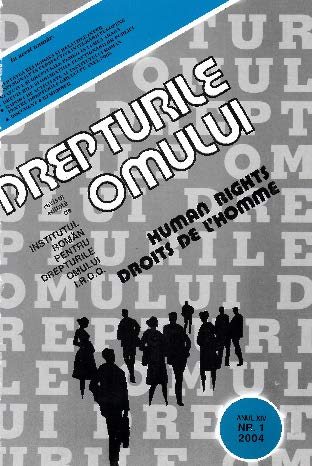De la Declarația Universală a Drepturilor Omului și Convenția europeană pentru apărarea drepturilor omului și libertăților fundamentale la Carta drepturilor fundamentale a Uniunii Europene
From the Universal Declaration of Human Rights and the European Convention for the Protection of Human Rights and Fundamental Freedoms to the Charter of the Fundamental Rights of the European Union
Author(s): Irina ZlătescuSubject(s): International Law, Human Rights and Humanitarian Law
Published by: Institutul Român pentru Drepturile Omului
Keywords: Universal Declaration of Human Rights; European Convention on Human Rights; Charter of Fundamental Rights of the European Union; freedom of religious beliefs;
Summary/Abstract: The Universal Declaration of Human Rights consecrates in its art. 18 the right of every person to “freedom of thought, conscience and religion”, while this right “includes freedom to change his religion or belief, and freedom, either alone or in community with others and in public or private, to manifest his religion or belief in teaching, practice, worship and observance”. Such acknowledgement of freedom of thought, conscience and religion was taken on by the following documents and is to be found as well in the International Covenant on Civil and Political Rights and other treaties including more recent ones. Freedom of religious beliefs and convictions may only be restricted as provided under the law and if such restrictions are necessary for the protection the security, order, public health, morals or the human rights and fundamental freedoms of others. The Optional Protocol to the International Covenant on Civil and Political Rights authorizes the Commission on Human Rights to receive and examine complaints on behalf of natural persons claiming to be victims of the violation of any human right laid down in the Covenant. The European Convention on Human Rights of 1950 is Council of Europe's first treaty and its main achievement. The European Convention on Human Rights expressly refers to the Universal Declaration of Human Rights but, unlike the latter, establishes a control system. Art. 10 in the Charter of Fundamental Rights of the European Union, entitled “Freedom of Thought, Conscience and Religion”, refers to the same issues: 1. Everyone has the right to freedom of thought, conscience and religion. This right includes freedom to change religion or belief and freedom, either alone or in community with others and in public or in private, to manifest religion or belief, in worship, teaching, practice and observance. 2. The right to conscientious objection is recognised, in accordance with the national laws governing the exercise of this right.
Journal: Drepturile omului
- Issue Year: 2004
- Issue No: 1
- Page Range: 3-8
- Page Count: 6
- Language: Romanian

